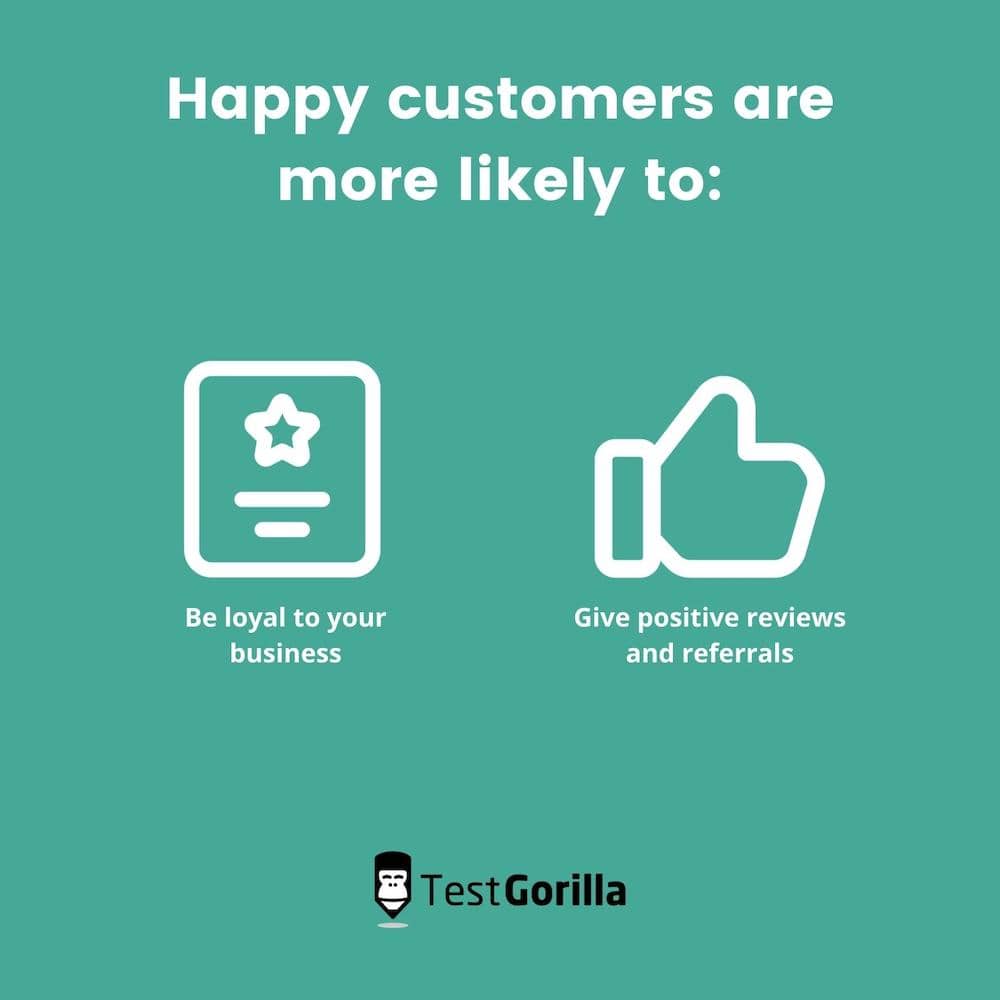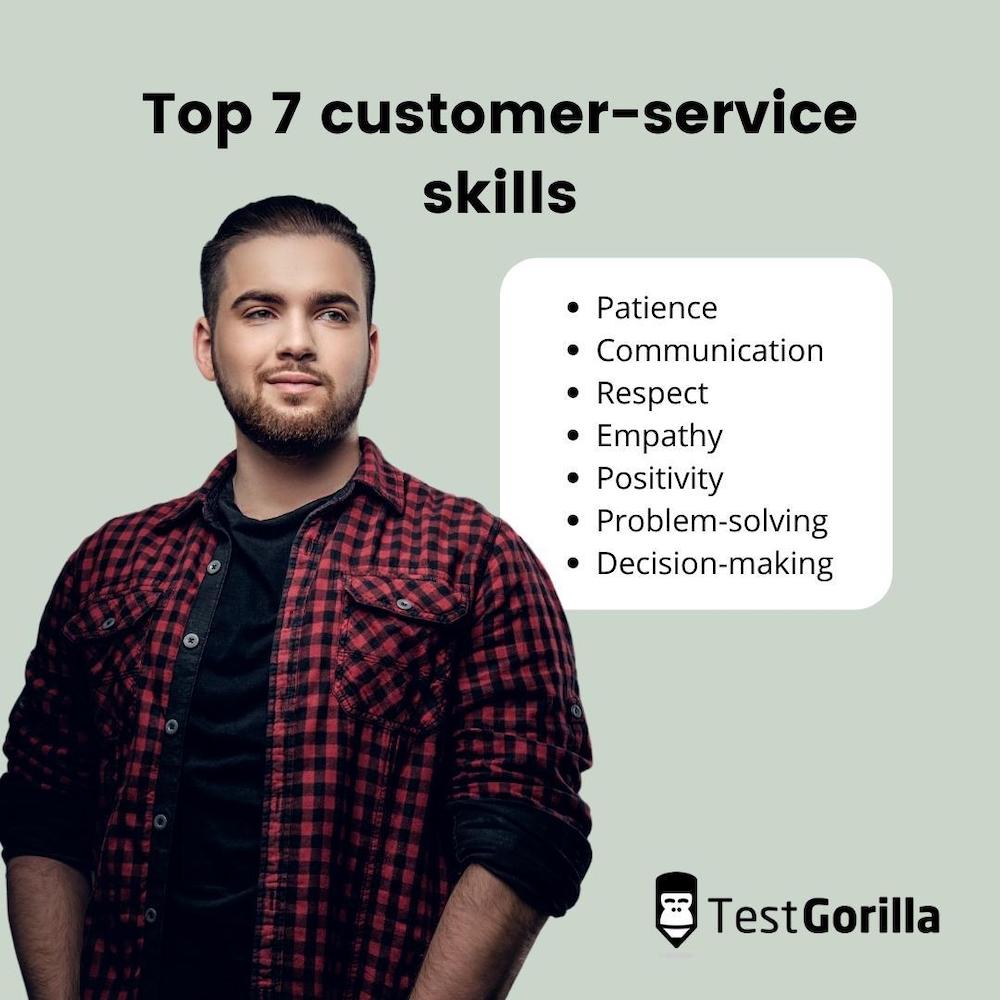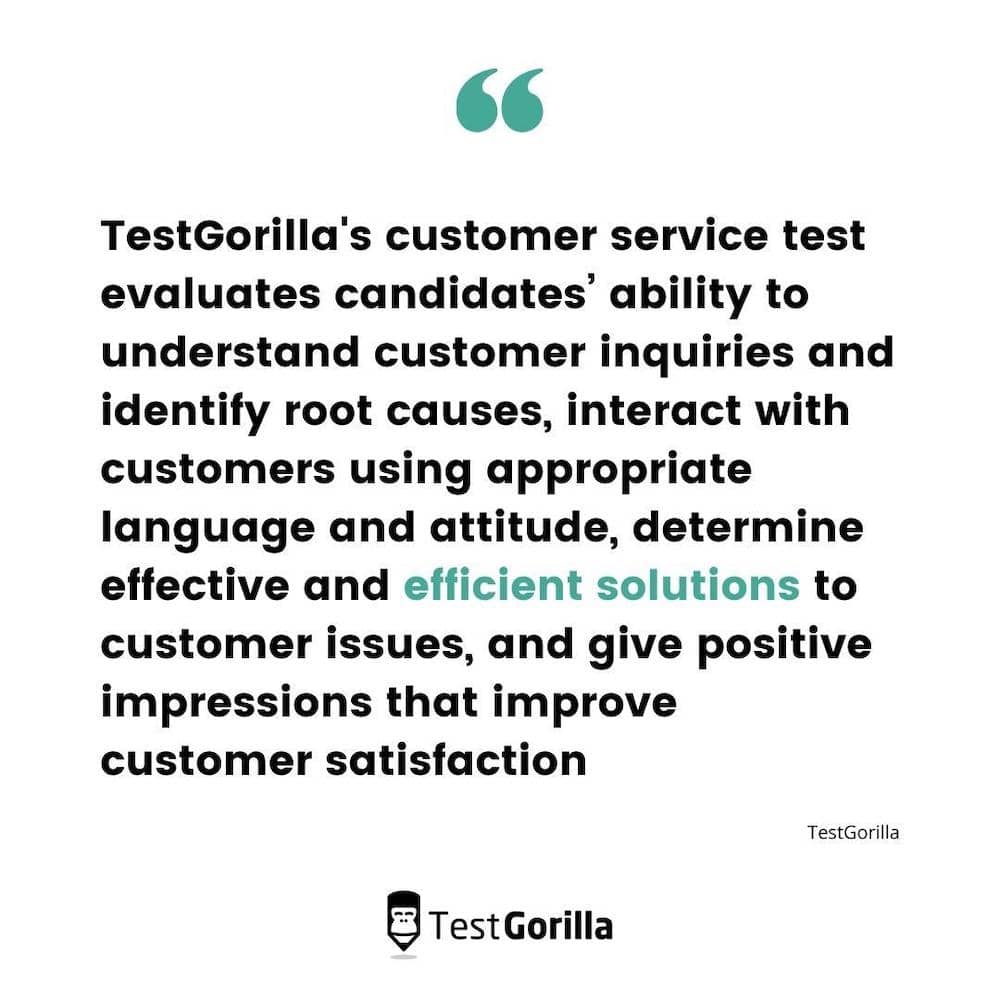In 2019, the Business Roundtable issued a statement in which firms put delivering value to customers and creating shareholder value on an equal plane.
Today, companies everywhere are competing on the basis of customer experience, so hiring people with top customer-service skills is becoming increasingly important for businesses. This blog post will explain more about skills to look out for to hire the best candidates for customer-service roles.
Table of contents
What is customer service?
Customer service makes up the public-facing frontier of any business, and when people talk about customer service they could be referring to either a job or a skillset. There are customer-service jobs in many industries, but as a job category, it can either refer to roles in retail and hospitality, or roles within any given company’s customer-service team. In both cases, serving and supporting customers is a mainstay of the job.
As a skillset, customer service is more widely relevant. No matter the industry, anyone who is in a job where they have to interact with customers, in person, over the phone, or online, will need to have proficient customer-service skills in order to do that job well. Contrary to popular belief, there is no golden rule to customer service: just a selection of skills that can be applied efficiently and thoughtfully to make sure customer interactions are the best they can be.
Customer-service skills
This refers to a candidate or employee’s ability to make or break those direct, one-on-one interactions between brand and customer. Such interactions are at the front line of business – developing and marketing an excellent product is only part of the battle, and most of it happens in the background. If businesses want to be competitive and build a brilliant reputation, then they should be striving to make the customer experience comfortable, pleasant, and simple.
Quality customer service goes beyond the moment of sale
Although the moment that a sale is actually processed is important, there is far more to customer service than ensuring this transaction goes smoothly. Customer service starts as soon as a customer lands on your website. And the best customer-service reps know that they need to guide and support customers after the sale, too, quickly answering any queries they might have and approaching any issue that arises with patience and empathy.
For some businesses, customer onboarding will be a stage where quality customer service is essential. Out of 216 people surveyed in 2020, 86% said they’d stay more loyal to businesses that invest in onboarding content that welcomes and educates them after purchase.
More often than not, customer service is not just about the contact your customers have with your employees. This is because the customer experience is increasingly happening online, and so the quality of that experience might depend upon how usable your website is, or how useful your chatbot is if you have one.
Customer support
The true purpose of a business, Peter Drucker said, is to create and keep customers. Most managers understand this, but few behave as if they do.
HBR, ‘Are You Undervaluing Your Customers?’ (2020)
Customer support is the phrase most commonly used to describe the services provided to customers after they have purchased a product or service. Offering high-quality customer support enables customers to make the most of products and services and resolve any problems they might be having. People with top customer-service skills will be the best candidates for both customer service and customer support roles.
Why it matters
It’s hard to overstate the importance of good customer service and support. According to a 2021 survey, 60% of US and UK consumers say they will stop buying from a brand after a poor customer-service experience. Bad customer service is costly for businesses and organizations, and failures to deliver on this front have the potential to be just as disastrous as failures on the product or management side of things, if not more.
But let’s not dwell on the negatives. If your team’s customer-service skills are good enough to provide your customers with enjoyable encounters and reliable support from your brand, you can count on the positive impact being significant. Here’s why.
Good customer service leads to happy customers
Happy customers are the most valuable kind of customer for your business. Luckily, the power to determine whether they are happy or not pretty much lies completely in the hands of your business.
There are several factors that will impact whether or not people are happy with the products or services that they pay for. But research suggests that customers value the quality of the personal interactions they have with brands more than anything else, especially since the COVID-19 pandemic.
50% of US consumers say that COVID-19 has increased their prioritization of customer service as a factor when deciding to do business with a brand
CGS (2022)
If people are having bad customer-service experiences with your company, then the quality of what you offer is overshadowed. It feels more personal than a product-related failure, and so, naturally, customers will take it more personally. Ramp up the quality of your customer service and the chances are people will take product failures with more patience and understanding, too.
Customer loyalty
In addition, happy customers are loyal to the businesses they enjoy interacting with and buying from. It’s a well-known fact that customer retention is less costly than customer acquisition, and research shows that the cost of acquiring new customers is only increasing.
Loyal customers are more likely to continue buying your products and services than prospective or newly acquired customers. In addition, they are more likely to try out or purchase the new things your company has to offer as it grows its portfolio of products and services over time.
Because of this, investing in improving your customers’ experiences with your brand is smart and worthwhile, and hiring people with the necessary skills is one of the best ways to do this.
Having customers advocate for you is priceless
Take a second to think about all the brands you’ve raved about to your friends. Why was this? No one is asking or paying you to sit and talk about the brilliant coffee shop you’ve started frequenting before work, or the online retailer that processed a return and refund in an impressive amount of time. So, why do we bother?
Human beings are social creatures: every day we share and talk about the experiences we have. When we have a good experience with something, we endorse it to the people we care about. If we have a bad experience with a particular brand, we share it with others in the hope of protecting them from a similar incident.
Although these personal conversations are totally invisible to the companies in question, the rise of social media has given customer advocacy renewed visibility. Prospective customers will be more likely to act based on a tweet from someone they know and trust than an assortment of online reviews from strangers.
Loyal customers are vital for growth, and are the most valuable ambassadors for your business, especially in digital spaces. They are the ultimate organic and sustainable drivers of sales. Working to make customers happy and loyal is far more cost-effective than other marketing strategies, and this loyalty gets harder to build if bad customer service is bulldozing your reputation.
If you’re looking for competitive advantages, improving customer service is a no-brainer
Research into customer service says just as much. According to Harvard Business Review, brands that lead in customer satisfaction rankings for three or more years grow revenues 2.5 times as fast as their industry peers, and deliver two to five times the shareholder returns over the next 10 years.
Investing in your customers’ experiences is bound to bring returns, and every customer who continues using your brand is one less doing business with your competitors. What’s more, if you offer excellent customer service then you can justify increasing the prices of your products or services. According to CGS, 30% of customers are willing to pay more for excellent service in 2022, a 6% increase from 2019. Providing the best customer experience is a huge factor for success.
Top 7 customer-service skills
As the information above suggests, customer service is incredibly important for businesses and organizations. So, employing and investing in applicants with excellent customer-service skills is a must.
Change to: “Since there are a million ways to be good or bad at interacting with people, a wide range of call centre skills falls into this category. To help you easily identify the best customer-service candidates, we’ve narrowed it down to the top seven customer-service skills you should be looking for.
Together with in-depth knowledge of your brand and its products or services, with these skills candidates are best equipped to deliver the kind and efficient service that customers want.
Patience
This is an exceedingly important trait for those working in customer-service roles to have. Customers will have less of a grasp on your products, services, and processes than your employees, and the questions that come to your customer-service team will reflect this.
Patience is therefore essential when guiding customers to solutions that will seem far more obvious to you than to them. Although its important to both customers and customer-service employees to get problems solved quickly, speaking to somebody who is rushed and impatient can be detrimental to a customer’s experience.
In addition, customers might be frustrated or irritated about the problem they’ve encountered with your brand. The angry customer is a well-known stereotype and is certainly rooted in some truth: if you’ve ever had a bad day and got unnecessarily angry at whoever got your lunch order mixed up, you’re not alone. Patience is the best way to approach and de-escalate these situations – it’s at the heart of good and kind customer service.
Communication
The importance of communication is also hard to over-emphasize. It’s considered one of the most important soft skills that employers look for in candidates for any position, but this is especially true for customer-service roles. In jobs where the goal is to ensure customer care and support are the best they can be, written and verbal communication and active listening are of the essence.
Candidates with excellent communication skills will be able to interact with customers in a way that makes them feel as if they are being listened to and are in safe hands. If you hire people with all seven of the skills listed here, then of course the reality will be that they are. Miscommunication is a time-killer and can easily escalate pre-existing frustrations, and there are few things customers value more than a quick, clear response.
It doesn’t matter if a candidate is a pro with all the other skills listed here: if they can’t communicate well, then they won’t be able to offer the high-quality customer service your brand needs to attract loyal customers. For this reason, you might want to consider testing candidates for their communication skills, too.
Respect
Top customer-service candidates will have total respect for customers and the problems they might come to your team with. They will take every query seriously, no matter how big or small, making sure each customer is heard and supported.
Although this quality has less to do with finding a solution, it can dictate the tone of an interaction and will subsequently have an impact on customer experience. Customers that feel respected and prioritized during an encounter will associate those empowering feelings with your brand. As a result, they are more likely to continue using your products or services and recommend them to others.
Empathy
Empathy goes hand in hand with respect when ensuring that a high quality of customer support is achieved. Candidates who empathize with your customers in order to understand the problems they might be having are more likely to get to the bottom of it and do so kindly, calmly, and effectively.
Empathy is a quality that embodies patience, respect, and communication, and the ability to put yourself directly in another person’s shoes is incredibly valuable, maybe even vital, for customer-service job applicants to have. No matter how frustrated customers might be by the problems or queries they bring to your customer-service team, empathy is the best way for you to show them that your brand or business genuinely cares.
Positivity
It’s important for people in customer-service roles to stay positive, too. Would you be likely to purchase a product if the person serving you was being negative? And would you feel good about having your concerns over a product addressed and handled in a gloomy, dismissive way? If your answers are no and no, then you’ve just confirmed the importance of positive customer-service interactions.
Candidates who excel in customer-service roles will be able to take on anything in a positive and upbeat manner. This is important for service and support because customers will associate optimism and uplifting tones with your products and services, and they’re more likely to feel secure about being in the hands of your team.
Hire applicants who can remain calm, and approach customer interactions with an authentic positive attitude, and you’ll be a big step closer to keeping your customers happy, satisfied, and loyal.
Problem-solving
These last two skills are essential if you want to hire candidates who will deal with customers’ issues and queries quickly and efficiently. For any team or business to run smoothly, problem-solving is a vital skill for employees to have, especially in hospitality or sales.
After customers have been nurtured through a purchase (and successfully onboarded, if this is relevant for your business), then they are likely to only get in touch with your company if they have a problem that needs to be solved. They’ll probably want this problem solved quickly – 12% of Americans quote lack of speed as their main frustration with customer service – though not if this means they get a brash or unhelpful response.
Candidates who are proficient in problem-solving will be able to quickly identify the nature of a problem and the necessary steps that should be taken to resolve it without compromising the quality of their service. In addition, they’ll be independent enough in their thinking to solve problems with customers alone rather than needing supervision. A team of independently-working problem-solving wizards can cover lots of ground, and quickly. Teams like this hold a significant advantage since the speed of response and resolution from brands is a key part of customer experience.
Decision-making
Like problem-solving, decision-making is a skill that your most efficient customer-service candidates will have. Hiring candidates who have the confidence to think and make decisions for themselves helps teams save time and boost productivity, so this is a skill to look out for if you want streamlined customer service and support processes.
Candidates who are good at making decisions are knowledgeable enough to be confident in the path they choose, but they also have the integrity to hold themselves accountable if they get it wrong. Everybody makes mistakes, and customers value honesty and a willingness to keep digging confidently for solutions. If you approach issues with confidence, customers will feel reassured that they’re in capable hands.
Good decision-making is about critical thinking, too, since it requires that sound judgments are made quickly. The best candidates will know how to think on their feet and, crucially, when to ask for help or direct queries elsewhere.
Hiring candidates for customer-service roles
If you’ve read as far as this section, by now you’ll understand why quality customer service and support are of the utmost importance for business. Next, you might wonder: how can I ensure I hire people with excellent customer-service skills? If you want your brand to be competitive in the customer experience battlefield, you’ll need an army of talent who have proved their proficiency with the skills listed above.
Using pre-employment skills assessments for recruitment
The only failsafe way to employ people with excellent customer-service skills without seriously prolonging the recruitment process is to use pre-employment skills assessments. Because these skills are hard to evaluate during an interview or when looking at experience on a CV, you need a role-specific skills test to get a real sense of your candidates’ proficiency.
TestGorilla’s customer-service test will effectively evaluate your applicants’ abilities to respond to customer issues appropriately and take a customer-centric approach when solving problems. However, you’ll need to create a complete skills assessment in order to get a well-rounded picture of each candidate.
5 tests to use alongside our customer-service skills test
If you’re looking to fill a customer-service position, you can choose to use any of the tests from the hundreds in our test library. The following, however, are recommended for assessing customer-service applicants:
Customer-service test. This is the best way to evaluate candidates’ all-round customer-service skills
HubSpot CRM test. This test assesses candidates’ skills in HubSpot sales, marketing, and customer-service software. If your business uses HubSpot, this is for you
Zendesk CS test. This test will identify candidates who can use Zendesk support products to solve problems effectively
Problem-solving test. This test evaluates candidates’ ability to define problems and interpret infromation in order to find solutions
Culture add test. This will tell you how well your candidates’ values and behaviours align with those of your organization based on a customized survey you fill out
Once you’ve administered your assessments and shortlisted candidates, it may be time to give them an interview. We’ve compiled 23 customer-service interview questions to help you hire the right talent.
Join TestGorilla to combine tests, custom questions, and interviews and start making skills-based hires today.
Related posts
Hire the best candidates with TestGorilla
Create pre-employment assessments in minutes to screen candidates, save time, and hire the best talent.
Latest posts
The best advice in pre-employment testing, in your inbox.
No spam. Unsubscribe at any time.

Hire the best. No bias. No stress.
Our screening tests identify the best candidates and make your hiring decisions faster, easier, and bias-free.
Free resources
This checklist covers key features you should look for when choosing a skills testing platform
This resource will help you develop an onboarding checklist for new hires.
How to assess your candidates' attention to detail.
Learn how to get human resources certified through HRCI or SHRM.
Learn how you can improve the level of talent at your company.
Learn how CapitalT reduced hiring bias with online skills assessments.
Learn how to make the resume process more efficient and more effective.
Improve your hiring strategy with these 7 critical recruitment metrics.
Learn how Sukhi decreased time spent reviewing resumes by 83%!
Hire more efficiently with these hacks that 99% of recruiters aren't using.
Make a business case for diversity and inclusion initiatives with this data.






















